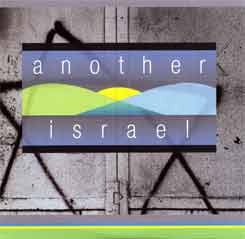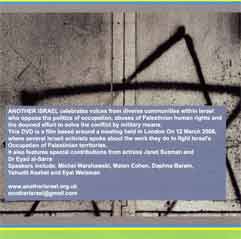Another Israel
ANOTHER ISRAEL is currently inactive but we reproduce material below dating from its heyday in 2008. The exhibition, though a little dated now, is still available for use.
About us
Exhibition panels
Brochure
Past events
DVD of launch meeting
ANOTHER ISRAEL celebrates voices from diverse communities within Israel who oppose the politics of occupation, abuses of Palestinian human rights and the doomed effort to solve the conflict by military means.
It is supported by Jews for Justice for Palestinians, the Palestine Solidarity Campaign, the Israeli Committee Against House Demolitions (ICAHD-UK) and Independent Jewish Voices.
The ANOTHER ISRAEL exhibition
The exhibition panels can be viewed here. Below is the text of the accompanying brochure
This exhibition celebrates ANOTHER ISRAEL, an Israel for all its citizens that lives at peace with its neighbours and abides by international law. The exhibition does this by recording the activities of thirty of the hundreds of organisations of Israeli citizens, both Jewish and Palestinian, that are working to such ends.
Prospects for a Just Peace in the Middle East may look bleak but, there are grains of hope. Despite the many barriers, there are Israeli grassroots organisations opposing the occupation and campaigning for social, economic and civil rights for all. Many work, where possible, with Palestinian colleagues on equal terms, so countering Israeli paranoia and denial. More concretely they have worked together to break the siege on Gaza and to limit the damage caused by the Wall, at Bil’in and elsewhere.
Such groups wrote Amira Hass in Ha’aretz, 25 September 2007 “remind the Palestinians that there are other Israelis, so perhaps there is still hope. And in their immediate environment, they expose Israelis to facts and experiences that make it difficult for them to keep wallowing in their voluntary ignorance and disregarding the dangers that our oppressive regime poses over the Palestinians.”
Seven core areas of work
Civil Inequalities
This section covers freedom of travel, the treatment of detainees, the use of torture, and workers’ rights both within Israel and in the Settlements and rights to family life. It includes both Palestinian and Jewish Israeli groups that attempt to uphold equal rights in the context of Israeli law. The Groups include two specifically concerned with the rights of Palestinian citizens of Israel – Adalah, and Mossawa – and the Association for Civil Rights in Israel (ACRI), Gisha (Legal Centre for the Freedom of Movement), HaMoked (Centre for the Defence of the Individual), Kav La’Oved (Worker’s Hotline), Public Committee Against Torture in Israel (PCATI) and Yesh Din (Volunteers for Human Rights).
Whose Land?
The issue of dispossession and rights to land are at the centre of the conflict. Civil-rights groups often take up individual disputes, while other groups look at the systematic biases in the land development system that leave Palestinian citizens of Israel living four times more densely than comparable Jewish Israelis. They campaign politically and act physically against the demolition of Palestinian homes and the annihilation of Palestinian history in the land. Other groups are concerned with the denial of clean water and proper waste disposal for Palestinian communities. The Groups covered are: Israel Committee Against House Demolition (ICHAD), Bustan (Sustainable Orchard), Bimkom (Planners for Planning Rights), Zochrot (Remembrance). The Israel/Palestinian Centre for Research and Information (IPCRI) has also taken up the obliteration of Palestinian historic/ religious monuments.
Telling it how it is
A number of organisations devote their energy to documenting aspects of the occupation, including illegal acts by settlers, the military and the police. They publicise these in a variety of media, and languages to the Israeli population, often producing detailed maps unavailable elsewhere,. They are an important and reliable source of information for international organisations and media. Organisations that concentrate on formal governmental processes and on working jointly on possible political initiatives, like the Geneva Initiative are not included. Those covered are: B’tselem and Settlement Watch, part of Peace Now, that work only in Occupied Territories, and the Alternative Information Centre (AIC) and IPCRI, which work in both areas.
Challenging Military Practices
Some Israelis have refused to serve the Occupation almost from its inception. Since the first Lebanon war and the second intifada ‘refusenik’ numbers have increased dramatically. They include young conscripts, as well as reservists, responding to the contradiction between the values of their background and the practices they experience on the ground and from the air. In the last few years two new types of groups have emerged and are focused on here: Breaking the Silence documents the realities of the occupation, through photos and videos taken by serving soldiers. These have been displayed in Israel and the USA. Combatants for Peace, have linked up with former Palestinian fighters to oppose militaristic solutions to the conflict.
Action without Violence
Israelis and Palestinians are working together on non-violent direct actions of various types. These take the form of small- and large-scale demonstrations which are often met with violent responses from the Israeli police and military. They involves rabbis trying to protect Palestinians from settler violence, particularly during the olive harvest and medical workers providing services to those cut off by the Wall and checkpoints from the help they need. In addition to Rabbis for Human Rights and Physicians for Human Rights-Israel, this section includes Anarchists against the Wall and Gush Shalom which not only provides weekly commentary on the horrors of occupation, but seeks to organise against the sale of goods produced in the settlements.
Working Together
Though the asymmetry of power is recognised, many groups see the increasing segregation and distrust between the two peoples as a key issue. There are a range of projects, some very small and local, that seek to build a common understanding based of mutual respect and real collaboration. These include the world famous village of Neve Shalom – Wahat al-Salam, Windows a project bringing Israeli and Palestinian teenagers together, the Parents’ Circle of bereaved families from both sides, Ta’ayush and individual initiatives exemplified by the Villages Group
Women for Peace
Women’s organisations, including the twenty-year-old Women in Black, are a central component of the Israeli Peace Movement. They are loosely grouped in the Coalition of Women for Peace and include organisations with local Palestinian members and partners in the occupied lands. The best known is MachsomWatch (Checkpoint Watch) which monitors the treatment of Palestinians at the checkpoints on a daily basis, producing regular reports of the human rights violations that continually occur. Other organisations include the feminists of Bat Shalom and New Profile, a group that challenges the militarism running through Israeli society.
This exhibition celebrates Another Israel, an Israel for all its citizens that lives at peace with its neighbours and abides by international law. The exhibition does this by recording the activities of thirty of the hundreds of organisations of Israeli citizens, both Jewish and Palestinian, that are working to such ends.
Some organisations that represent the hope for Another Israel
|
|
Israelis also work with Palestinians on bi-national schooling, summer camps and broader peace education, and on physical and mental health projects. In addition to the organisations covered by our exhibition, there are many other forms of resistance to the dominant agenda in Israel, including community radio, journals, news wires, critical literature, film, photography and musical events. Daniel Barenboim’s embracing of both national identities is a potent example.
Fuller information on each organisation, including information about donating and volunteering is available from their websites, listed on the Jews for Justice for Palestinians’ website (search on google if any links don’t work). Donations may be gift-aided to many of them through the British Shalom-Salaam Trust at www.bsst.org.uk.
Borrowing the exhibition
For further information and to book the exhibition, please contact the organisers at anotherisrael@gmail.com. We can also supply speakers to open the exhibition.
Past Events include
May 10-17, Barbican • The Pit • 7.45pm
IN SPITTING DISTANCE by Tajir Najib /
May 29, Belsize Park, 7.30pm for 8.00 pm
Jeff Halper in conversation with Prof Jacqueline Rose
June 10, Tuesday 7.00 pm, central London
THE BATLE FOR JERUSALEM A one-hour film followed by a discussion with Prof Avi Shlaim, Dr Karma Nabulsi and Liran Atzmor the film’s director
May 10-17
__________________________________
* IN SPITTING DISTANCE by Tajir Najib / Barbican • The Pit • 7.45pm
1-hour, 1-man 1-act play about the trials of travelling as a Palestinian
who holds an Israeli passport. /Tickets available for a special performance
and post-show talk (play continues until May 17).
__________________________________
May 29, Belsize Park, 7.30pm for 8.00 pm
Jeff Halper in conversation with Prof Jacqueline Rose
Thursday, 29 May at 7:30pm for 8:00 In conversation with Prof Jacqueline Rose from Independent Jewish Voices. Interchange, 213 Haverstock Hill, London NW3 4QP. Directly across from Belsize Park Tube Station. Buses 168, C11, 268. Tickets: £7 can be purchased in advance using the PayPal facility on this website, www.icahduk.org or on the door. Concessions of £3 for students will be available on the night.
You are invited to hear Professor Jeff Halper, Co-ordinator of the Israeli Committee Against House Demolitions (ICAHD) at venues around the UK for the launch of his new book, “An Israeli in Palestine: Resisting Dispossession, Redeeming Israel”.
Jeff Halper, a Professor of Anthropology, has been a leading figure within the Israeli peace movement for over thirty years. Jeff was nominated by the American Friends Service Committee (the Quakers) for the 2006 Nobel Peace Prize, together with the Palestinian intellectual and activist Ghassan Andoni. During 2007, Jeff received the following two awards on behalf of his work with ICAHD: Olive Branch Award from Jewish Voice for Peace in the USA and the Rachel Corrie Peace Award from the Italian town of Ovada near Genoa.
“An Israeli in Palestine” records Jeff’s revelation that he is actually living in another country: Palestine. Without dismissing the legitimacy of his own country, he realises that Israel is defined by its oppressive relationship to the Palestinians. Pleading for a view of Israel as a real, living country which must by necessity evolve and change, Jeff asks whether the idea of an ethnically pure ‘Jewish State’ is still viable. More to the point, he offers ways in which Israel can redeem itself through a cultural Zionism upon which regional peace and reconciliation can be attained.
“Jeff Halper’s book, like his life’s work, is an inspiration. … he offers one of the most insightful analyses of the occupation I’ve read. His voice cries out to be heard.”
Author Jonathan Cook
__________________________________
June 10, Tuesday 7.00 pm, central London
THE BATTLE FOR JERUSALEM, 1948
One war three stories: Jerusalem, at the dawn of a new Middle East. The end of the British Mandate. The birth of a Jewish state. A Palestinian catastrophe. Sixty years later, images can be shown from three opposing points of view, telling a whole new story. Just how important are pictures to the survival of one story and how does that account for the destruction of the other?

| A quality, edited DVD of highlights of the Another Israel launch meeting in March 2008, including many of the Judah Passow images projected on the night, is now available.Price £5 per copy plus 50p. p&p. Five or more copies post free. Bulk discounts available for bookshops, trade unions, etc.
Please email orders to jfjfp@jfjfp.org – you will then be contacted with payment details. |
|



